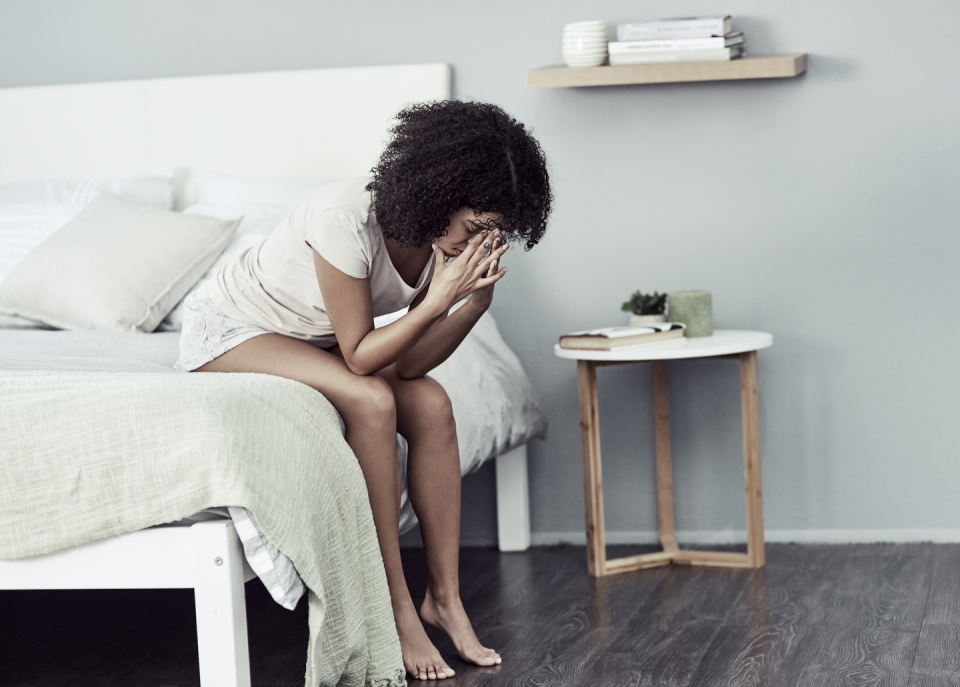Here's why you get the hangover shakes after a heavy drinking session

You all know the story: you wake up the morning after the night before feeling groggy AF, with a mouth that tastes like something's died in it and a hand so shaky you could easily be in the midst of an earthquake measuring ten on the richter scale. It's genuinely hell.
Jokes aside, we've all been there. Whether it was an early Christmas knees-up, a family party with far too much free booze, or you just had a big one with your best pals, booze can get the better of you and, in turn, result in some pretty horrific hangover symptoms.
Like? Hangover shakes. Hot and cold sweats. A thumping headache. Nausea. Fatigue. A dry mouth.
They're all pretty bad, but hangover shakes can be particularly annoying, especially if you've got plans that sober, mindful you made before you got absolutely slaughtered. They're also a real giveaway that you've been out boozing the night before. But what exactly causes the god-forsaken shakes?
We spoke to consultant hepatologist and liver expert Dr Alastair O'Brien from The London Clinic to find out, and what he revealed as the cause was actually quite a lot worse than we'd imagined... It's well worth taking note of this.

What causes hangover shakes?
The trembling you experience following too much alcohol is in fact your body having withdrawal symptoms from all the booze you've plied it with. It's basically a mild version of what someone with a drug addiction would have to endure when cutting their use, the expert explains.
"The tremors and the sweats come from an overactive sympathetic nervous system; they’re withdrawal symptoms," said Dr O'Brien.
And it's exactly the reason the hair of the dog works so well; as soon as you give your body what it's been craving, it reverts to 'normal' again and your symptoms stop.
"The hair of the dog will temporarily make you feel a bit better because some of the symptoms you are experiencing are a direct withdrawal effect," he explained. "After the first drink you feel like superwoman; you feel brilliant, your sweats and shakes go away."
But it won't last for long, the doctor warns.
"After the second drink, you’re back down where you were before. Your body is feeling bad for a reason, so listen to it." Hear, hear.
How to stop hangover shakes
Dr O'Brien says it's simple: maybe don't drink quite enough for your body to go into shaking mode in the first place.
Though that's definitely easier said than done for some, and if you're already past the point of no return – read: five wines in – these small hangover cure tips could help:
Drink a water with every alcoholic drink
Neck a pint of water pre-bed
Eat a hearty balanced breakfast with carbs, fats and proteins
Get at least 8 hours sleep
Drink lots of water throughout the day
Try some B vitamins and folic acid
Avoid ultra processed foods, as much as you're likely craving them.
And none other than The Body Coach, aka Joe Wicks, agrees, once telling Cosmopolitan UK that the trick to curing any hangover is a good balanced breakfast.

"If you can get up in the morning, drink loads of water and have a high fat, high protein breakfast like an omelette or some scrambled eggs; you're going to feel so much better and your energy levels are going to be much more constant," he shared.
Are hangover shakes dangerous?
As annoying as they are, hangover shakes aren't immediately a cause for concern, says biomedical expert Dr Naheed Ali.
"When alcohol leaves your system, it can be tough on the body, causing those shakes," he explains. "They're often just part of a hangover, but can also signal deeper issues with alcohol. For people with anxiety, shakes can worsen symptoms or even trigger setbacks. "
However, it's worth noting how often you find yourself plagued by the shakes - and totting up how regular those big nights out are becoming.
"If they're persistent, it may mean a more profound dependence on alcohol," Dr Ali continues. "f you see a pattern, seeking support is a smart choice. The approach depends on the person. Some may just need to cut back, others may need structured help.
"If tremors are a regular guest after drinking, it signals the need for action."
If your symptoms are continuously bad, you may potentially be showing symptoms of an alcohol allergy. Do make sure, if this is the case, to book a doctors appointment and get checked out.
The NHS recommends drinking no more than 14 units of alcohol a week, spread across three days or more. So roughly around six medium glasses of wine, or six pints of 4% beer. If you're struggling with alcohol misuse, it could also be worth considering sobriety and speaking to a professional, such as your GP, for support and guidance on the next steps.
Speak to your GP, or call Alcoholics Anonymous for free on 0800 9177 650 or email help@aamail.org.
This article is not intended to be a substitute for professional medical advice or diagnosis. Always seek the advice of your physician or other qualified health provider with any questions you may have regarding a medical condition.
You Might Also Like

